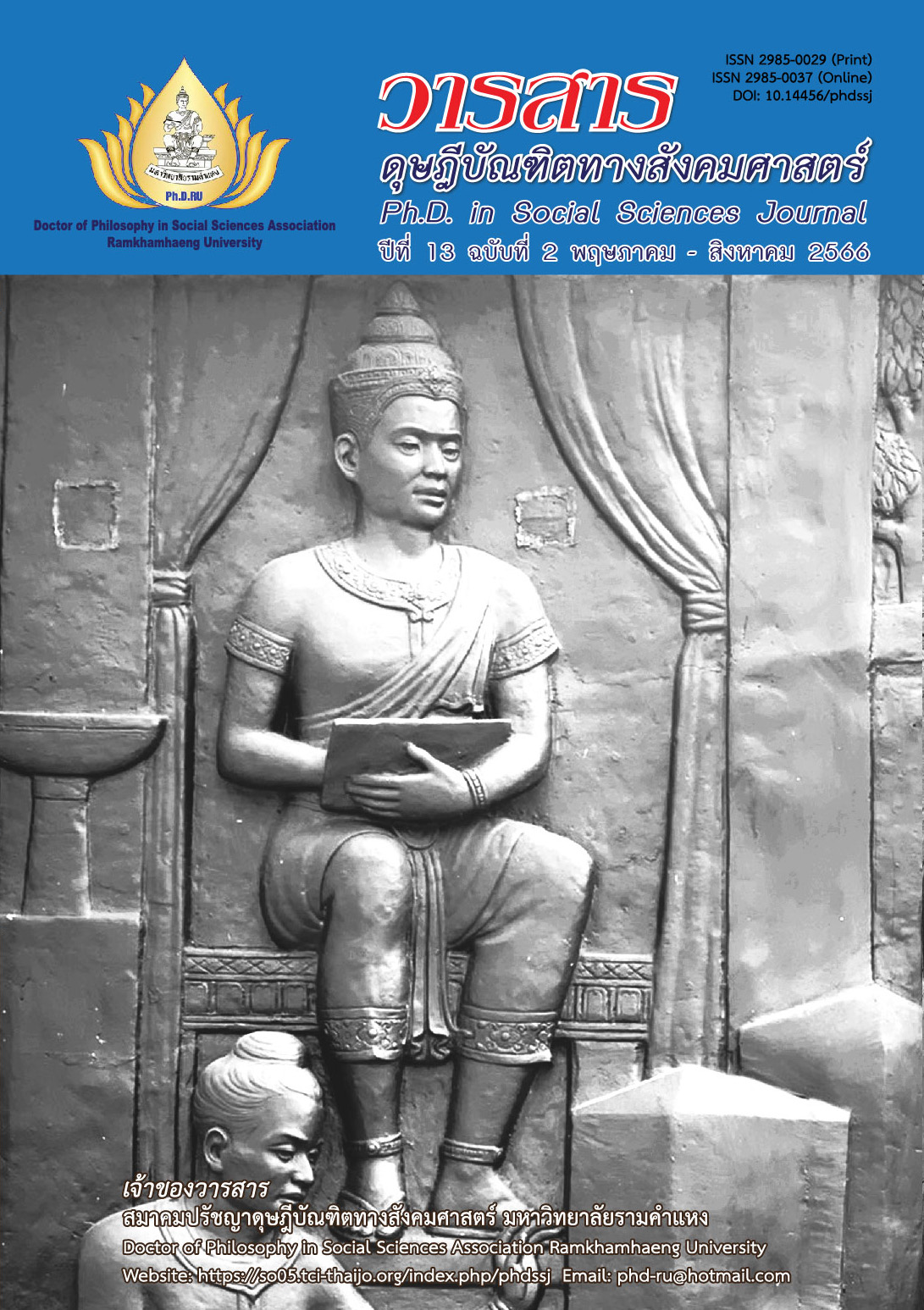Influencing Factors of Wage Increase Trend in Thailand (2022-2023)
Main Article Content
Abstract
This academic article aims to discuss the factors that affect wage increases in Thailand, particularly in 2022-2023, and suggests improving the workforce’s skills to match wage adjustments. It draws from Gerhart and Newman (2020) on organizational competitiveness and wage determination. The analysis also includes trends in Thailand’s wage increases and factors influencing wage adjustments in Thailand, as analyzed by the World Bank (2023), Trading Economics (2023), United Nations Development Program (2020), and International Monetary Fund (2020), as well as relevant documents and research. The article proposes recommendations to increase the workforce’s skills to manage with wage adjustments and adoptive competitiveness, based on the concepts of Milkovich, Newman, and Gerhart (2017), along with related research. The synthesis and presentation of conclusions align with the relevant concepts and theories in each topic, serving as a framework for analysis.
Findings are as follows: Wage adjustments are influenced by various factors, including economic growth, inflation rates, government policies, industry-specific factors, and internal factors, especially the bargaining of labor unions. Employers with the potential to increase wages during the years 2022-2023 should focus on upgrading the workforce’s skills to adapt to wage adjustments and enhance organizational competitiveness.
Article Details

This work is licensed under a Creative Commons Attribution-NonCommercial-NoDerivatives 4.0 International License.
Academic articles, research articles, and book reviews in the Ph.D. in Social Sciences Journal are author’s opinions, and not the publisher’s, and is not the responsibility of the Ph.D. in Social Sciences Journal Philosophy Association, Ramkhamhaeng University. (In the case that research is done on human, the researcher has to be trained in Ethics for Doing Research on Human Training and has to produce the evidence of the training).
References
Atigala, P., Maduwanthi, T., Gunathilake, V., Sathsarani, S., & Jayathilaka, R. (2022). Driving the pulse of the economy or the dilution effect: Inflation impacting economic growth. PLoS ONE, 17(8), 1-17.
Autor, D. H. (2019). Work of the past, work of the future. AEA Papers and Proceedings, 109, 1-32.
Card, D., & DiNardo, J. E. (2022). Skill-biased technological change and rising wage inequality: Some problems and puzzles. Journal of Labor Economics, 20(4), 733-783.
Gerhart, B., & Newman, J. M. (2020). Compensation (13th ed). McGraw-Hill.
International Monetary Fund. (2020). Five things to know about Thailand’s Economy and COVID-19. Retrieved from https://www.imf.org/en/News/Articles/2021/06/21/na062121-5-things-to-know-about-thailands-economy-and-covid-19
International Labour Organization. (2017). Electrical and electronics manufacturing in Thailand: Exploring challenges and good practices in the workplace. Retrieved from https://www.ilo.org/asia/publications/WCMS_575610/lang--en/index.htm
Ivancevich, J. M. (2010). Human resource management (11th ed). McGraw-Hill.
Lawler, E. E. (2012). Effective human resource management: A global analysis. Stanford Business Books.
Lazear, E. P. (2000). Performance pay and productivity. American Economic Review, 90(5), 1346-1361.
Leckcivilize, A. (2015). Does the minimum wage reduce wage inequality? Evidence from Thailand. IZA Journal of Labor & Development, 4(21), 2-23.
Martocchio, J. J. (2015). Strategic compensation: A human resource management approach (8th ed.). Pearson.
McMahon, D. (2019). Upskilling and reskilling for the fourth industrial revolution. Retrieved from https://www3.weforum.org/docs/WEF_EGW_White_Paper_Reskilling.pdf
Medina, A. F. (2022). Thailand Increases daily minimum wage rates for 2022. Retrieved from https://www.aseanbriefing.com/news/thailand-increases-daily-minimum-wage-rates-for-2022
Milkovich, G. T., Newman, J. M., & Gerhart, B. (2017). Compensation (12th ed.). McGraw-Hill.
Mondy, W. R. (2012). Human resource management (12th ed.). Pearson.
Ministry of Labor. (2022). The minimum wage of Thailand. Retrieved from https://shorturl.asia/wsGvJ [In Thai]
Napathorn, C., & Chanprateep, S. (2011). Reasons why Thai employees want to Join labor unions: Evidence in private companies and state enterprises. International Journal of Business and Management, 6(12), 58-64.
Rosenbloom, J. L., & Milkovich, G. T. (1991). Handbook of flexible benefits. Irwin Professional.
Samart, W., & Kilenthong, W. (2021). Effect of minimum wage on changes in the Thai labor market. Retrieved from https://www.pier.or.th/files/dp/pier_dp_137.pdf [In Thai]
Thailand Development Research Institute. (2013). TDRI analyzes pros and cons of 300 baht minimum wage policy. Retrived from https://tdri.or.th/2013/01/labour300 [In Thai]
The Nation. (2023). Labour unions remind govt of wage increase promise in May Day demand. Retrieved from https://www.nationthailand.com/in-focus/40015059
Trading Economics. (2023). Thailand minimum daily wage. Retrieved from https://tradingeconomics.com/thailand/minimum-wages
United Nations Development Program. (2020). Human development report 2020. Retrieved from https://www.undp.org/thailand/publications/human-development-report-2020-overview-thai-english
Wang, J. (2011). Wage policy in Thailand, International labor organization. Retrieved from https://www.ilo.org/asia/info/public/WCMS_161480/lang--en/index.htm
Woodtikan, P. (2013). Collective bargaining as a mechanism toward good labor relations in Thailand. Suthiparithat Journal, 27(82), 115-135. [In Thai]
World Bank. (2021). Thailand overview: Development news, research, data. Retrieved from https://www.worldbank.org/en/country/thailand/overview
World Bank. (2023). The World Bank in Thailand: Thailand economic monitor. Retrieved from https://documents1.worldbank.org/curated/en/099245012132249289/pdf/P1797380511f390920aab30472d7e1f8276.pdf


